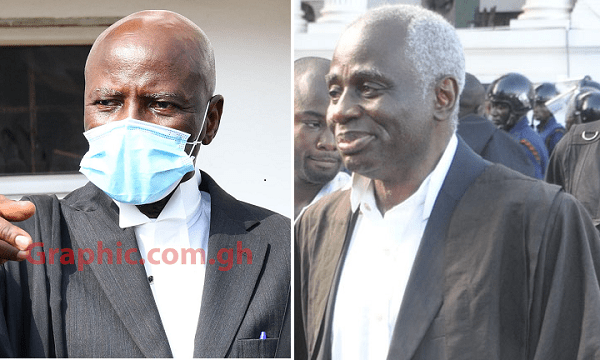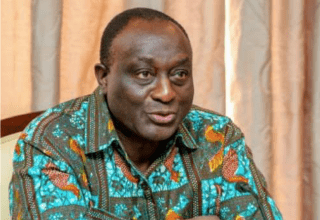
Lawyers for the petitioner and the two respondents in the 2020 presidential election petition have filed their closing addresses, seeking to further convince the Supreme Court to uphold their respective cases.
While lawyers for former President John Dramani Mahama (petitioner) are urging the court to uphold their client’s case, those for the Electoral Commission (EC) (the first respondent) and President Nana Addo Dankwa Akufo-Addo (the second respondent) have described the petition as frivolous and impressed on the court to dismiss it.
Lawyers for the respondents filed their closing addresses on February 17, while the petitioner’s address was filed last Tuesday.
Former President Mahama, the presidential candidate of the National Democratic Congress (NDC) in the December 7, 2020 elections, filed the petition on December 30, last year to challenge the declaration of President Akufo-Addo as the President-elect by the Chairperson of the EC, Mrs Jean Adukwei Mensa.
He is urging the apex court to declare the declaration by the EC as unconstitutional and order a run-off between him and President Akufo-Addo.
Mahama’s address
In their closing address, lawyers for the petitioner argued that their client had successfully proved that President Akufo-Addo did not win the December 7, 2020 presidential election because no candidate obtained more than 50 per cent of the total valid votes cast, as stipulated by Article 63(3) of the 1992 Constitution.
They argued that the evidence to prove that no candidate won the 2020 presidential election was in the declaration announced by the Chairperson of the EC on December 9.
The petitioner, they said, was not the returning officer for the election and, therefore, he had no obligation to present figures in support of his claim that no candidate won the election.
Also, the lawyers contended that the petition was challenging the constitutionality of the declaration by the EC; therefore, the petitioner only had to prove that the said unconstitutionality related to the declaration and nothing more.
“The fact that the petitioner is not disclosing in the petition what he or other candidates should have obtained, compared to the numbers declared by the first respondent, cannot lead to a conclusion that the declaration by the chairperson of the first respondent is constitutional,” the closing address stated.
The petitioner’s lawyers are also calling on the court to take cognisance of the fact that the respondents, specifically the EC, failed to present the Chairperson of the commission, Mrs Mensa, to testify in support of the assertion by the EC that it made an ‘inadvertent error’ in the declaration.
Such a move, they argued, meant that the court could not attach any evidential value to the respondents’ answers challenging the petition.
No basis
Lawyers for the EC and President Akufo Addo contended that the petitioner woefully failed to prove his case, arguing that the basis for the petition that no candidate won the election was false.
With regard to President Akufo-Addo, his lawyers argued that although the Chairperson of the EC had, during the declaration, inadvertently used the total votes cast (13,434,574) as the total valid votes cast (13,121,111), that was not a ground to prove that President Akufo Addo did not obtain more than 50 per cent of the valid votes.
“The summation of the total valid votes cast in favour of all the 12 candidates yields 13,121,111 as the total number of valid votes cast. It must be noted that a straightforward and simple computation of the valid votes declared in favour of second respondent (President Akufo-Addo) as a percentage of the total valid votes of 13,121,111 yields a percentage of 51.295 per cent,” the closing address said.
Such a fact, the lawyers contended, was confirmed by the first witness of the petitioner (Mr Johnson Asiedu), who is the General Secretary of the NDC.
“Apart from the fact that this figure is incontrovertible, the petitioner failed and/or refused to provide any contrary evidence that would establish or at least suggest that the valid votes declared for the 12 candidates were erroneous,” it said.
For the EC, its lawyers argued that the total valid votes that were used to declare a person President-elect were calculated on data from all the polling stations.
“The total valid votes cast is calculated based on data and not based solely on the words of the returning officer. It is especially so when there had been an admission that the figure announced was an error,” the EC added.
Jurisdiction
Another leg of the closing addresses by lawyers for the respondents is the propriety of the petition.
Lawyers for President Akufo-Addo argued that the petition was not challenging the validity of the election but rather raises the case of how the Chairperson of the EC performed her function as the returning officer of the presidential poll.
That, they contended, meant the petition did not meet the criteria of a presidential election petition, as set out in Article 64(1) of the 1992 Constitution, and, therefore, the petitioner had failed to invoke the jurisdiction of the Supreme Court.
“It is our submission, therefore, that the instant petition properly belongs to the class of actions which can best be described as ‘suits challenging the declaration’, rather than the validity of the election itself,” it said.
Relying on a case Rojo Mettle-Nunoo vs the EC in 2007, lawyers for President Akufo-Addo argued that the Supreme Court held in that case that a challenge to a declaration did not mean the election itself was invalid.
“A declaration as President can be set aside and voided and the person declared elected will still have been duly elected President. The only result from an action challenging the declaration of a person as President, if successful, may be an annulment of the declaration and a new declaration ordered, but not voiding the election conducted throughout the country,” the address stated.
With respect to the EC, its lawyers contended in their closing address that it was clear that the petitioner had failed to properly invoke the presidential election petition jurisdiction of the apex court.
“The jurisdiction of the court, under Article 64(1), is distinct from the enforcement and interpretative jurisdiction of the court,” it added.
Writer’s email: emma.hawkson@graphic.com.gh
Source: graphic.com.gh

















